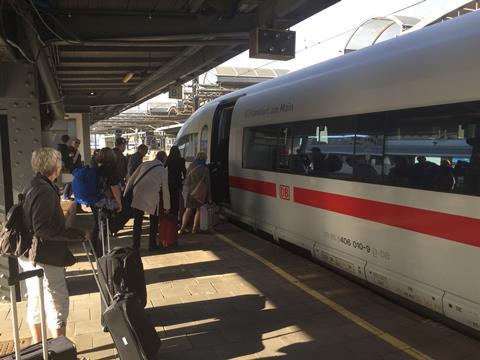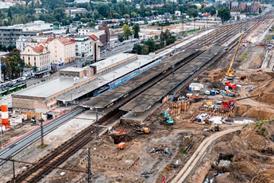
EUROPE: The International Union of Railways, International Association of Public Transport and European railway suppliers’ association UNIFE have called for ‘a new sense of urgency’ in developing a more sustainable transport mix, arguing that decision makers need to look beyond the Covid-19 pandemic and its aftermath and not forget that ‘the rising danger’ of climate change ‘has not stopped during the crisis’.
Public transport and railways must have a central place ‘in the world of tomorrow’, the organisations said in a joint statement on June 3.
Pointing out that ‘our world is more interconnected than ever before in history’, the associations said this brings new risks, including the increased possibility of pandemics, accepting that for the transport sector, the health and climate change challenges are closely linked.
‘Mobility services provide the connectivity that enables increased trade and the ability of modern economies to create ever greater prosperity’, the associations pointed out, while noting that ‘unsustainable’ transport modes account for 22% of all greenhouse gas emissions, and reiterating that ‘rail’s carbon footprint is significantly smaller than those of other transport modes’.
Suggesting that ‘the aftermath of the Covid 19 crisis will be the occasion to build a new normal for the world of tomorrow’, UIC Director General François Davenne said ‘railways have demonstrated their resilience and their capacity to deliver essential services, even in these difficult circumstances. We all know that railways and public transport are the key for a sustainable future.’
UNIFE Director General Philippe Citroen said that ‘Covid-19 has quickly brought into focus the necessity for impactful climate action and economic resilience worldwide’. He believed that the Multiannual Financial Framework for 2021-27 and the Next Generation EU proposals put forward by the European Commission would be ‘powerful recovery instruments that can help complete EU Green Deal objectives but they must be mobilised for the decarbonisation of European transport.’ However, this would only be possible ‘through a greater multimodal mobility shift with rail at its backbone’.
Emphasising that ‘public transport provides an essential service in our cities around the world, UITP Secretary General Mohamed Mezghani said ‘we must continue to recognise the role it plays in delivering action on climate. Public transport and the environment are inextricably linked and with a strong local network, emissions are lowered and our cities become healthier and more sustainable. By working with UIC and UNIFE to examine the changes brought on by Covid-19, we can commit to building a sustainable future, giving public transport a central place in the world of tomorrow.’
Reshaping mobility
Committing to continue working for a world ‘shaped by energy efficiency’, the three associations suggested that ‘the customer experience must be revolutionised through the creation of a seamless multimodal mobility network that utilises flow management to anticipate consumer patterns. If we act now, rail and public transport can be more widely associated with freedom, flexibility and comfort.’ With concerted effort, they believed, ‘it is possible to reform cumbersome elements of public transport which act as a barrier to usage.’
Pointing out that more capacity would be needed ‘to handle ever-increasing mobility demands’, the associations said work was underway to make networks ‘intelligent to optimise existing system usage’, but argued that investment in additional infrastructure would also be needed. Insisting that ‘we must maintain investment in new infrastructure projects, new rolling stock, and – above all – research’, they emphasised that this will require strong support from the European Union and its member states.
Noting that the Commission has designated 2021 as the European Year of Rail, the associations suggested that ‘it must also celebrate sustainable mobility and public transport. ‘The Covid-19 crisis will not go on for ever. We will once again be able to safely meet, to talk to each other face-to-face, and to share a bus, tram, metro or train ride.’

















